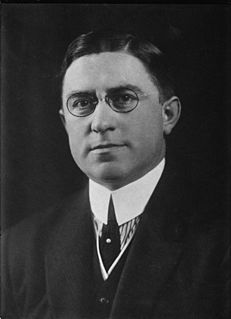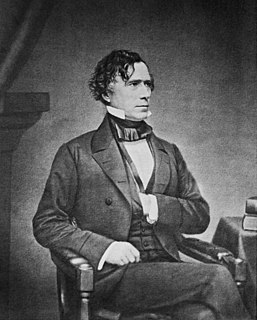A Quote by Wright Patman
In the United States we have, in effect, two governments ... We have the duly constituted Government ... Then we have an independent, uncontrolled and uncoordinated government in the Federal Reserve System, operating the money powers which are reserved to Congress by the Constitution.
Related Quotes
I have long been in favor of a balanced budget restriction at the level of the federal government of the United States. Because the federal government has money-creating powers it can, in fact, be very damaging if it runs a series of budget deficits. With the state government in the United States, they don't have money-creating powers. The automatic discipline imposed by the fact that they are in a common monetary unit and don't have control over the money power means that the balanced budget restriction is less needed.
The tenth amendment said the federal government is supposed to only have powers that were explicitly given in the Constitution. I think the federal government's gone way beyond that. The Constitution never said that you could have a Federal Reserve that would have $2.8 trillion in assets. We've gotten out of control.
I see,... and with the deepest affliction, the rapid strides with which the federal branch of our government is advancing towards the usurpation of all the rights reserved to the States, and the consolidation in itself of all powers, foreign and domestic; and that, too, by constructions which, if legitimate, leave no limits to their power... It is but too evident that the three ruling branches of [the Federal government] are in combination to strip their colleagues, the State authorities, of the powers reserved by them, and to exercise themselves all functions foreign and domestic.
To hold that Congress has general police power would be to hold that it may accomplish objects not intrusted to the general government, and to defeat the operation of the 10th Amendment, declaring that 'the powers not delegated to the United States by the Constitution, nor prohibited by it to the states, are reserved to the states respectively, or to the people.
The powers delegated by the proposed Constitution to the federal government are few and defined. Those which are to remain in the State governments are numerous and indefinite. The former will be exercised principally on external objects, as war, peace, negotiation and foreign commerce. ... The powers reserved to the several States will extend to all the objects which in the ordinary course of affairs, concern the lives and liberties, and properties of the people, and the internal order, improvement and prosperity of the State.
For states' rights advocates, the Constitution is like a contract that is openly violated by one party with impunity. On paper, the states remain sovereign powers, while in reality the federal government appears able to dictate everything from the ingredients of school lunches to speed limits. Congress now routinely collects taxes in order to return the money to the states with conditions on their conforming to federal demands.
Some people think the Federal Reserve Banks are US government institutions. They are not... they are private credit monopolies which prey upon the people of the US for the benefit of themselves and their foreign and domestic swindlers, and rich and predatory money lenders. The sack of the United States by the Fed is the greatest crime in history. Every effort has been made by the Fed to conceal its powers, but the truth is the Fed has usurped the government. It controls everything here and it controls all our foreign relations. It makes and breaks governments at will.
In explaining the Constitution, James Madison, the acknowledged father of the Constitution, wrote in Federalist Paper 45: 'The powers delegated by the proposed Constitution to the Federal government are few and defined. Those which are to remain in the State governments are numerous and indefinite. The former will be exercised principally on external objects, as war, peach, negotiation, and foreign commerce.' Has the Constitution been amended to permit Congress to tax, spend and regulate as it pleases or have Americans said, 'To hell with the Constitution'?
I consider the foundation of the Constitution as laid on this ground that 'all powers not delegated to the United States, by the Constitution, nor prohibited by it to the states, are reserved to the states or to the people.' To take a single step beyond the boundaries thus specially drawn around the powers of Congress, is to take possession of a boundless field of power not longer susceptible of any definition.
Today the path of total dictatorship in the United States can be laid by strictly legal means, unseen and unheard by the Congress, the President, or the people. Outwardly we have a Constitutional government. We have operating within our government and political system, another body representing another form of government - a bureaucratic elite.
The constitutionality and propriety of the Federal Government assuming to enter into a novel and vast field of legislation, namely, that of providing for the care and support of all those ... who by any form of calamity become fit objects of public philanthropy. ... I cannot find any authority in the Constitution for making the Federal Government the great almoner of public charity throughout the United States. To do so would, in my judgment, be contrary to the letter and spirit of the Constitution and subversive of the whole theory upon which the Union of these States is founded.
I consider the government of the United States as interdicted by the Constitution from intermeddling with religious institutions, their doctrines, discipline, or exercises. This results not only from the provision that no law shall be made respecting the establishment or free exercise of religion, but from that also which reserves to the States the powers not delegated to the United States. Certainly, no power to prescribe any religious exercise or to assume authority in any religious discipline has been delegated to the General Government. It must then rest with the States.






























